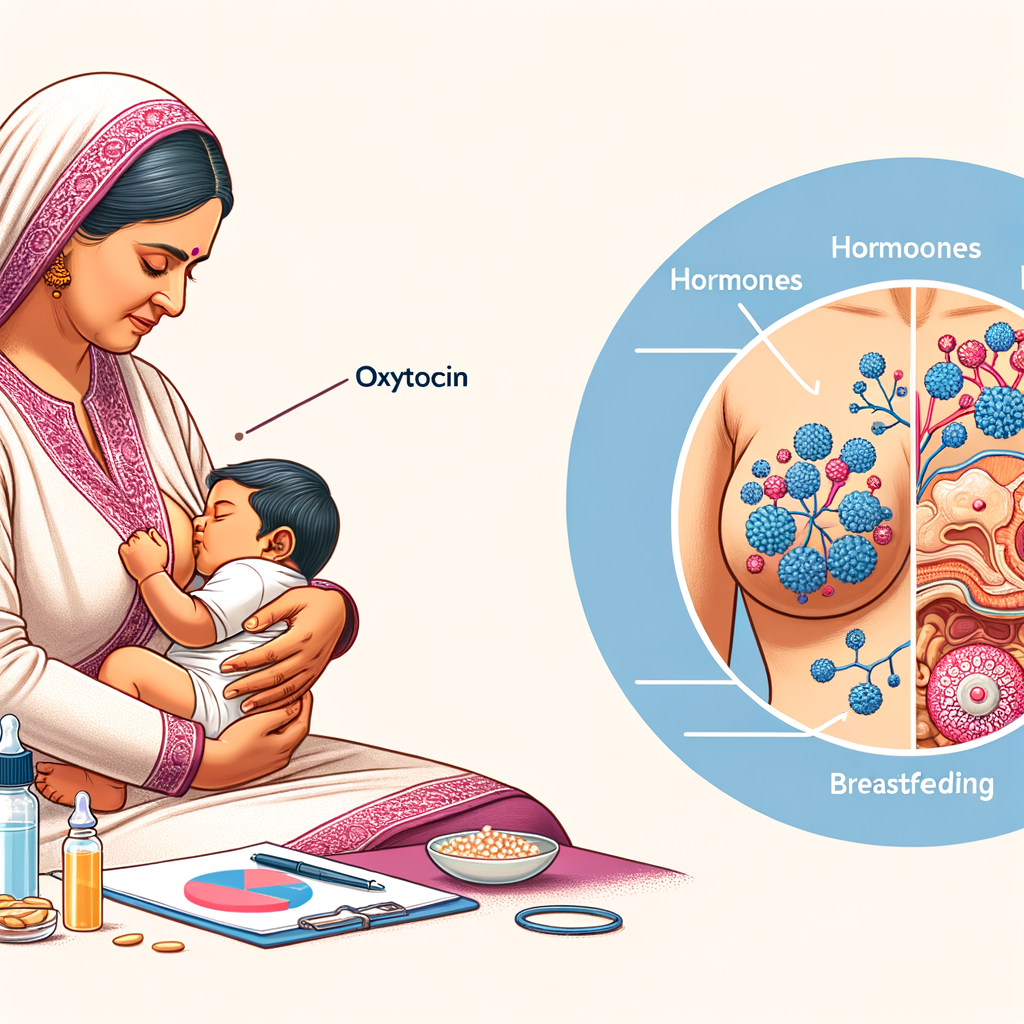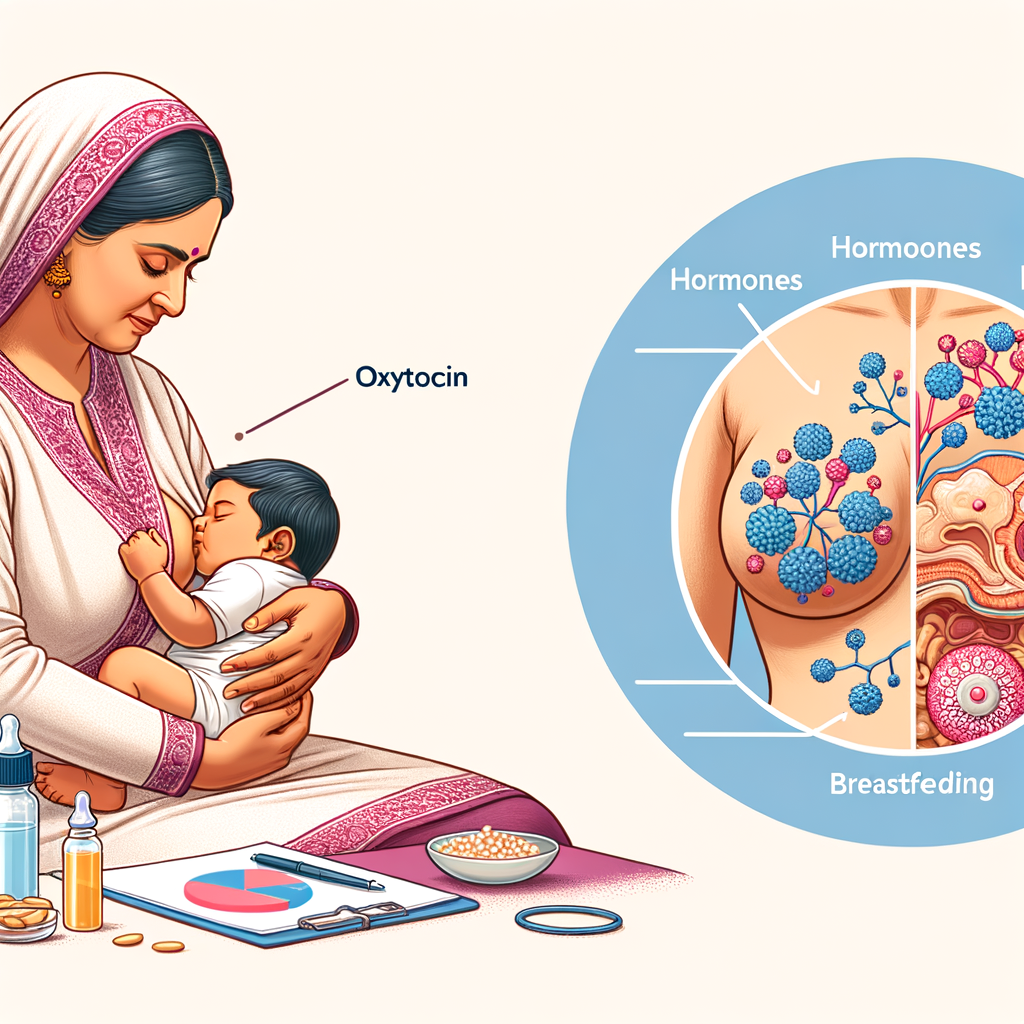
Introduction to Breastfeeding and Oxytocin
When it comes to nurturing a newborn, breastfeeding plays a crucial role. It’s a natural process that not only provides essential nutrients to the baby but also strengthens the bond between mother and child. At the heart of this process is a hormone called oxytocin. Let’s delve deeper into understanding these two key aspects.
- Understanding the basics of breastfeeding
Breastfeeding is the process of feeding a baby with milk directly from the mother’s breasts. It’s a special part of motherhood that offers numerous health benefits to both the mother and the baby. The milk produced by the mother, known as breast milk, is rich in nutrients and antibodies that help the baby grow and develop a strong immune system.
There are three stages of breast milk production. The first stage is colostrum, a thick and yellowish fluid produced during pregnancy and just after birth. It’s high in protein, low in sugar, and loaded with beneficial compounds. The second stage is transitional milk, which contains higher levels of fat, lactose, and water-soluble vitamins. The final stage is mature milk, which is 90% water and contains all the nutrients a baby needs.
- Introduction to oxytocin and its functions
Oxytocin is a hormone that plays a significant role in the breastfeeding process. It’s often referred to as the “love hormone” because it’s associated with feelings of love, bonding, and trust. But it’s not just about emotions. Oxytocin also has physical effects, especially in breastfeeding.
When a baby suckles at the mother’s breast, it triggers the release of oxytocin. This hormone causes the muscles in the breast to contract and release milk, a process known as the “let-down reflex”. Oxytocin also helps the uterus return to its normal size after childbirth and can even reduce postpartum bleeding.
Moreover, oxytocin promotes a sense of calm and well-being in the mother, helping her to bond with her baby. It’s a beautiful cycle of nature where feeding and caring for the baby stimulates the production of oxytocin, which in turn enhances the mother’s ability to nurture and love her child.
The Benefits of Breastfeeding
Breastfeeding is a natural process that provides numerous benefits for both the mother and the baby. Let’s delve into these advantages:
- Nutritional benefits for the baby
- Ear infections
- Diarrhea and vomiting
- Sudden Infant Death Syndrome (SIDS)
- Childhood leukemia
- Obesity
- Type 2 diabetes
- Health benefits for the mother
- Type 2 diabetes
- Certain types of breast cancer
- Ovarian cancer
- Emotional benefits for both mother and baby
Breast milk is often referred to as the “perfect food” for a baby’s digestive system. It contains the vitamins and nutrients that a newborn needs, and all its components — lactose, protein (whey and casein), and fat — are easily digested by a newborn’s immature system. Moreover, breast milk is packed with disease-fighting substances that protect your baby from illness. This is one of the most significant advantages of breastfeeding. According to the American Academy of Pediatrics, breastfeeding can help reduce the risk of many diseases in babies, including:
Breastfeeding doesn’t only benefit babies, but it’s also good for mothers. It can help burn extra calories, which can lead to weight loss. Additionally, it releases the hormone oxytocin, which helps the uterus return to its pre-pregnancy size and reduces post-delivery bleeding. Some research suggests that breastfeeding may lower the risk of certain health problems in mothers, including:
Breastfeeding can foster an early emotional connection between mother and baby. The skin-to-skin contact can nurture a strong bond and make the baby feel secure. It also boosts the mother’s confidence and emotional health. The act of breastfeeding releases oxytocin, often referred to as the ‘love hormone’, which promotes a sense of love, nurturing, and relaxation.
In conclusion, breastfeeding is a beneficial practice that contributes to the health and emotional wellbeing of both mother and baby. It is a unique process that strengthens the bond between mother and child while providing essential nutrients and health benefits.
Oxytocin and Breastfeeding: The Hormonal Symphony
When it comes to breastfeeding, there’s a beautiful hormonal symphony at play. One of the key players in this symphony is a hormone called oxytocin. Let’s delve deeper into understanding the role of oxytocin and how it’s produced during breastfeeding.
Understanding Oxytocin
Oxytocin is a powerful hormone that plays a crucial role in our bodies. It’s often referred to as the “love hormone” because it’s involved in bonding and relationship-building. But its role goes beyond just that. Let’s explore.
- The role of oxytocin in the body
- How oxytocin is produced during breastfeeding
Oxytocin is produced in the brain, specifically in an area called the hypothalamus. From there, it’s released into the bloodstream by the pituitary gland. This hormone plays a significant role in various functions such as childbirth, breastfeeding, bonding, stress reduction, and even pain relief. It’s like a multitasking superhero in our bodies!
During breastfeeding, oxytocin production is stimulated when the baby suckles at the mother’s breast. This action sends a signal to the mother’s brain to release oxytocin. Once released, oxytocin triggers the milk ejection reflex, also known as the ‘let-down’ reflex, which allows the milk to flow from the mother’s milk ducts into the baby’s mouth. It’s a beautiful and natural process that strengthens the bond between mother and baby.
In conclusion, oxytocin is a vital player in the hormonal symphony of breastfeeding. It not only facilitates the production and release of breast milk but also helps in creating a strong bond between the mother and her baby. Truly, the wonders of nature and the human body are astounding!
The Role of Oxytocin in Breastfeeding
When it comes to breastfeeding, the hormone oxytocin plays a crucial role. It has three main functions that aid in the process of breastfeeding and postpartum recovery. These include:
- Stimulating Milk Production
Oxytocin is a key player in the production of breast milk. When a baby latches onto the mother’s breast, it triggers the release of oxytocin. This hormone signals the milk-producing cells, known as alveoli, to contract and release milk into the ducts. This process is often referred to as the “let-down reflex”.
- Facilitating Mother-Infant Bonding
Beyond just physical benefits, oxytocin also contributes to the emotional aspects of breastfeeding. It’s often referred to as the “love hormone” because it promotes bonding between mother and baby. During breastfeeding, oxytocin levels rise, leading to feelings of love and attachment. This bonding experience can have long-term benefits for both the mother and the baby.
- Helping in Postpartum Recovery
Finally, oxytocin plays a significant role in postpartum recovery. After childbirth, the release of oxytocin helps the uterus return to its pre-pregnancy size. This process, known as “uterine involution”, can help prevent postpartum hemorrhage, a leading cause of maternal mortality. Additionally, the calming effect of oxytocin can help alleviate postpartum stress and anxiety.
In conclusion, oxytocin is a vital hormone in the breastfeeding process. It not only aids in milk production but also facilitates mother-infant bonding and assists in postpartum recovery. Understanding the role of oxytocin in breastfeeding can help mothers appreciate the incredible hormonal symphony that supports them and their baby during this special time.
Hormonal Balance in Breastfeeding
When it comes to breastfeeding, it’s not just about nourishing your baby. It’s also about maintaining a healthy hormonal balance in your body. Let’s delve into this fascinating topic.
- How breastfeeding contributes to hormonal balance
- The impact of breastfeeding on other hormones
Breastfeeding is a natural process that stimulates the production of certain hormones in the mother’s body. One of these is oxytocin, often known as the ‘love hormone’. This hormone not only helps with the milk let-down reflex but also promotes a sense of calm and bonding between mother and child.
Another hormone that plays a key role is prolactin. This hormone is responsible for milk production. The more a mother breastfeeds, the more prolactin is produced, creating a positive feedback loop that ensures a steady milk supply.
These hormones work in harmony, creating a balance that benefits both mother and baby. The act of breastfeeding helps to regulate these hormones, contributing to a healthy hormonal balance.
Breastfeeding doesn’t just affect oxytocin and prolactin. It also has an impact on other hormones in the mother’s body. For instance, breastfeeding can suppress the hormones responsible for ovulation, which is why many breastfeeding mothers experience a delay in the return of their menstrual cycle.
Additionally, breastfeeding can help to regulate the mother’s stress hormones. The act of breastfeeding, and the close physical contact it involves, can help to reduce levels of cortisol, the body’s main stress hormone. This can lead to a reduction in feelings of anxiety and stress, contributing to the mother’s overall wellbeing.
In conclusion, breastfeeding plays a crucial role in maintaining a healthy hormonal balance in the mother’s body. It’s a natural process that not only nourishes the baby but also contributes to the mother’s health and wellbeing.
Case Study: The Impact of Oxytocin on Breastfeeding
- Case Study Introduction
- Findings and Results
- Key Takeaways
Our case study focuses on the role of oxytocin, a hormone that plays a significant role in the breastfeeding process. This study was conducted on a group of new mothers over a period of six months. The objective was to understand the impact of oxytocin levels on the breastfeeding process and the overall health of both mother and child.
The study revealed that oxytocin plays a crucial role in the breastfeeding process. Mothers with higher levels of oxytocin had a smoother breastfeeding experience. They were able to produce milk more efficiently and their babies were more content and healthier.
| Parameters | Mothers with High Oxytocin Levels | Mothers with Low Oxytocin Levels |
|---|---|---|
| Milk Production | High | Low |
| Baby’s Health | Good | Average |
| Mother’s Mood | Positive | Negative |
These findings suggest that oxytocin not only aids in milk production but also positively impacts the mood of the mother, making the breastfeeding process more enjoyable and less stressful.
The study highlighted the importance of oxytocin in breastfeeding. It showed that higher levels of oxytocin can lead to a more successful breastfeeding experience. This hormone not only aids in milk production but also has a positive impact on the mother’s mood. Therefore, maintaining healthy oxytocin levels can be beneficial for both mother and baby during the breastfeeding process.
Conclusion: The Importance of Oxytocin in Breastfeeding
In this article, we have explored the critical role that oxytocin plays in the process of breastfeeding. As we conclude, let’s recap the key points and share some final thoughts on the hormonal harmony that occurs during breastfeeding.
- Recap of oxytocin’s role in breastfeeding:
- Final thoughts on the hormonal harmony in breastfeeding:
Oxytocin, often referred to as the ‘love hormone’, plays a crucial role in breastfeeding. It is responsible for the ‘let-down’ reflex, which allows milk to flow from the mother’s breast to the baby. This hormone also promotes a strong bond between the mother and the baby, enhancing the overall breastfeeding experience. The release of oxytocin during breastfeeding not only ensures a sufficient milk supply but also helps the mother’s body recover from childbirth.
Breastfeeding is a beautiful symphony of hormones working together for the benefit of both the mother and the baby. Oxytocin, along with other hormones like prolactin, creates a harmonious balance that facilitates successful breastfeeding. This hormonal interplay is nature’s way of ensuring the survival and well-being of the newborn. Understanding this complex process can help mothers appreciate the importance of breastfeeding and encourage them to persevere through any challenges they may face.
In conclusion, oxytocin is not just a hormone; it’s a vital part of the breastfeeding journey that fosters a deep connection between the mother and the baby. The more we understand about this remarkable hormone, the more we can support and advocate for breastfeeding mothers worldwide.














